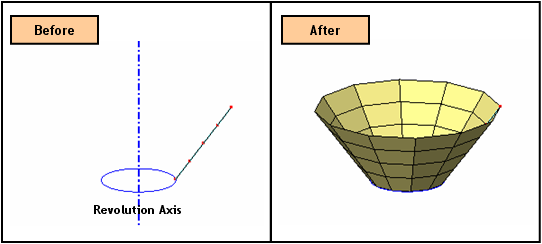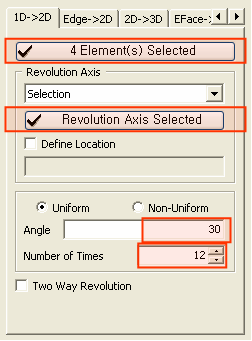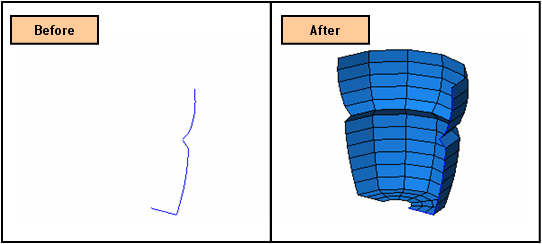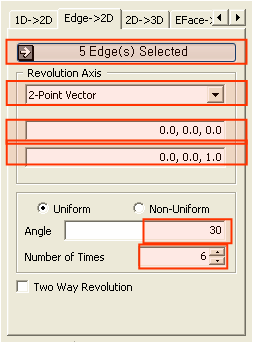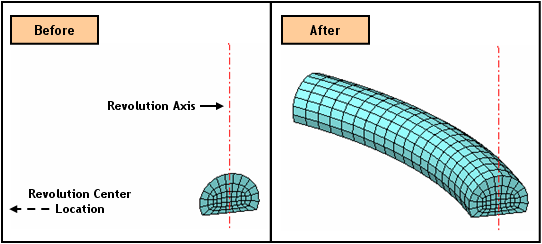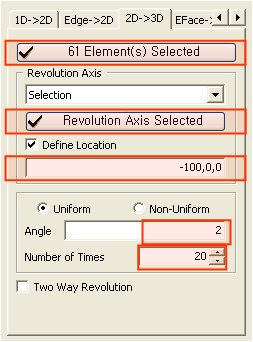Protrude Mesh: Revolve Mesh

Function
Extrude Mesh creates elements by revolving a node to a 1D element, a 1D element to a 2D element, a Edge to a 2D element, and a 2D element to a 3D element.
Call
Mesh > Protrude Mesh > Revolve
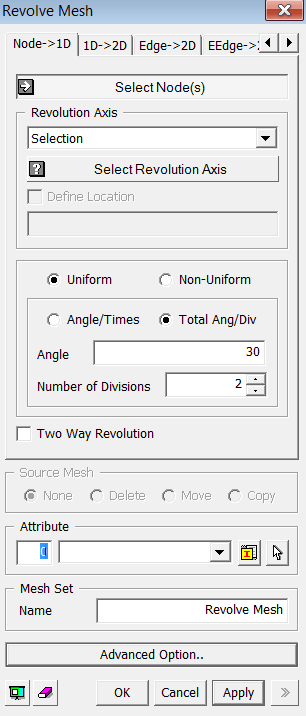
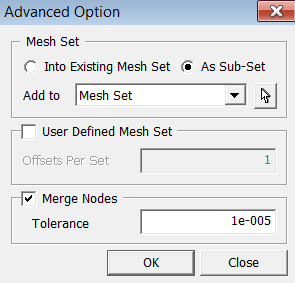
<Revolve Mesh : Node->1D>
<Node -> 1D>
Select Node(s)
Select the nodes (Mesh, Node) that will be revolved.
<Common Features>
Revolution Axis
Selection
Select a revolution axis (Datum Axis, Datum Plane, Face, Edge) directly.
Define Location
Enter the center coordinates of the revolution axis. The axis moves to the defined location.
2 Point Vector
Specify the revolution axis by a vector which is defined by two specified points. The coordinates of two points may be specified using Snap.
Uniform
Revolve the selected elements at a uniform angle by the number of times specified
Angle
Enter an angle for revolving.
Number of Times
Enter
the number of revolution.
Non-Uniform
Extrude
the selected nodes by specifying non-uniform distances entered as a function.
Enter multiple distances separated by commas (,).
For repetition, use the input format as the number
of times @ distance. Example) 30,20,2@15,20
Two Way Revolution
This option create the same mesh on the reverse side of specified direction.
Source Mesh
Specify
what will be conducted to Source Meshes after it has been extruded.
None
Leave
the Source Meshes as it is.
Delete
Delete
the Source Meshes.
Move
Move
the Source Mesh to the end of extrusion.
Copy
Leave
the Source Meshes as it is and copy it to the end of extrusion.
Mesh Type
Specify
an element type of extruded meshes.
Triangle
Generate
Triangular 2D meshes.
Quadrilateral
Generate
Quadrilateral 2D meshes.
User Defined Mesh Set
User can specify the number of offsets per set. If one number has been entered, it will uniformly register generated mesh by the number of offsets. If more than one number has been entered, it will non-uniformly divide the Mesh Set by the given numbers. The sum of the numbers should not be greater than the total number of offsets.
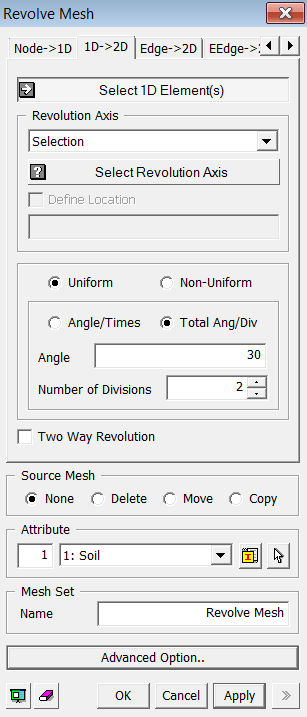
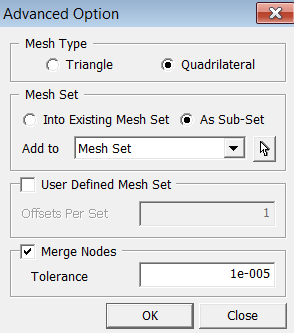
<Revolve Mesh : 1D->2D>
<1D -> 2D>
Select 1D-Element(s)
Select
the 1D elements (Mesh,
Element) that will be revolved.
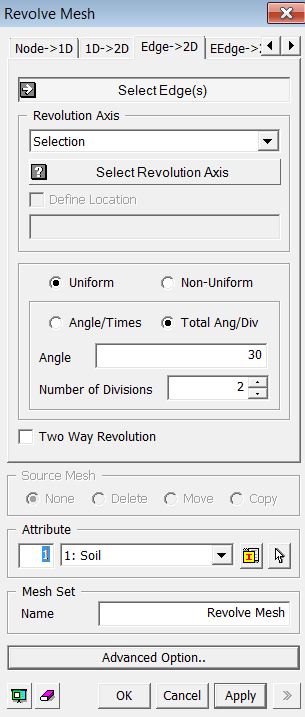

<Revolve Mesh : Edge->2D>
<Edge -> 2D>
Select Edge(s)
Select the Edges (Edge) that will be revolved.
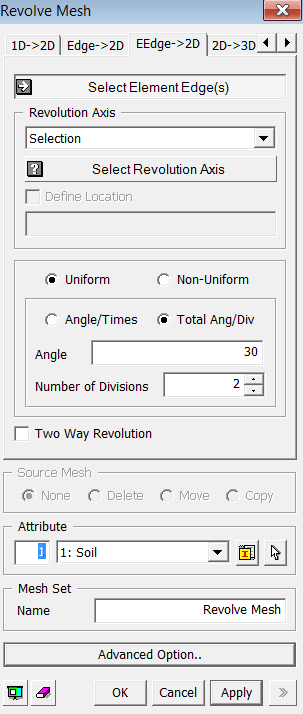
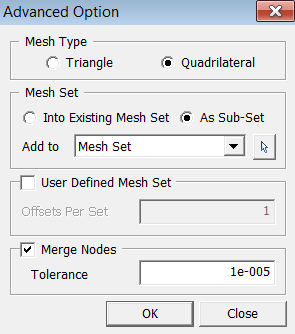
<EEdge -> 2D>
incomplete
beta version fill
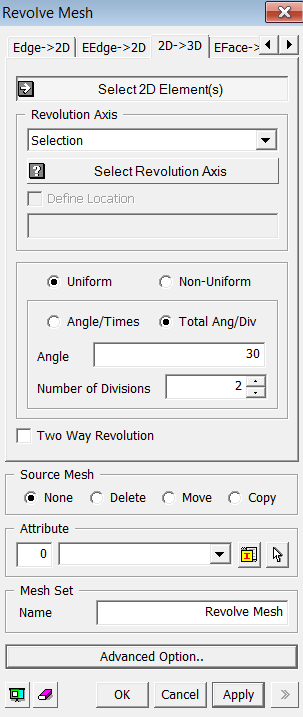

<Revolve Mesh : EFace -> 3D>
<2D -> 3D>
Select 2D-Element(s)
Select the 2D elements (Mesh, Element) that will be revolved.
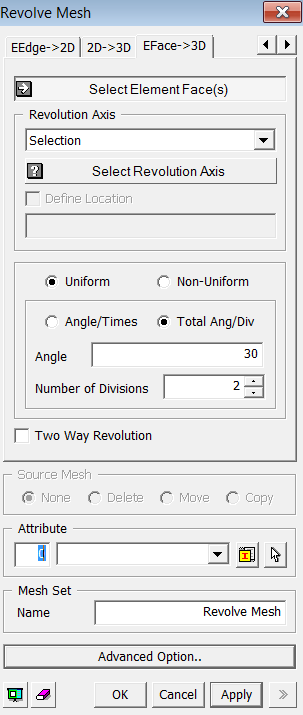

<Revolve Mesh : 2D->3D>
<EFace -> 3D>
Select 2D-Element(s)
Select the 2D elements (Mesh, Element) that will be revolved.
Notes
If the Source Elements are assigned with Plot Only element types, they would not be considered in analysis. Therefore, they are not necessary to be deleted after extrusion. However, if they are assigned something other than the Plot Only, they must be deleted so that they would not affect analysis result.
